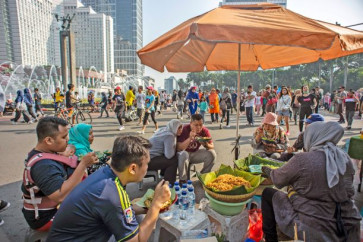Popular Reads
Top Results
Can't find what you're looking for?
View all search resultsPopular Reads
Top Results
Can't find what you're looking for?
View all search resultsWhat do we expect from the 2020 population census?
The population stories will be updated by the SP2020 next year. However, it will be quite challenging due to some issues such as a growing dominance of the privacy issue, public trust and limited leisure time for face-to-face interviews. As time passes, most Indonesians tend to become more individualistic and unwelcome toward censuses than before.
Change text size
Gift Premium Articles
to Anyone
A
lthough the 2020 population census ( SP2020 ) campaign was kicked off in February 2018, public discussions and publicity about this event are still very few. Considering its paramount importance and the massive scale of the data collection process, this issue is very crucial and needs to be addressed.
The SP2020 plays a pivotal role in providing data for evidence-based policy on population issues. It is the fourth-biggest population census conducted on earth after the population censuses in China, India and the United States, and will involve about 1 million field enumerators and supervisors. That is what makes this 10-yearly undertaking so costly.
Indonesia has a long experience in conducting massive population censuses. The first census covering the entire Dutch East Indies was held in 1930. The population was recorded at around 60.7 million people at that time. The postindependence population census was carried out for the first time three decades later in 1961. The SP2020 itself is the seventh consecutive population census conducted by Statistics Indonesia (BPS) after independence.
Over five decades, those censuses captured not only a high rate of population growth, from only about 97.1 million people in 1961 to 237.6 million in 2010. They also recorded the history of a tremendous demographic transformation of our nation in numbers. They told us the story about Indonesians who are getting healthier, more educated and more inclusive over time; the success tale of “Keluarga Berencana”, one of the world’s best family planning programs which prevented the births of 180 million babies in the period 1971 to 2010; and many others.
The population stories will be updated by the SP2020 next year. However, it will be quite challenging due to some issues such as a growing dominance of the privacy issue, public trust and limited leisure time for face-to-face interviews. As time passes, most Indonesians tend to become more individualistic and unwelcome toward censuses than before.
The situation is different from what happened during the 1990s. In that regard, public awareness and participation can be improved through active and massive-scale awareness-raising conducted consistently in the upcoming months until the census date next year.
Another challenge comes from the census itself. The SP2020 will use a new innovative method called the combined method which combines a registration-based census and the traditional one. Thanks to the success of recording population registration data through e-ID cards, which has covered 97.2 percent of Indonesians, the SP2020 will exploit the data to create a population database. The database will then be updated and completed with other necessary information through the census.


















